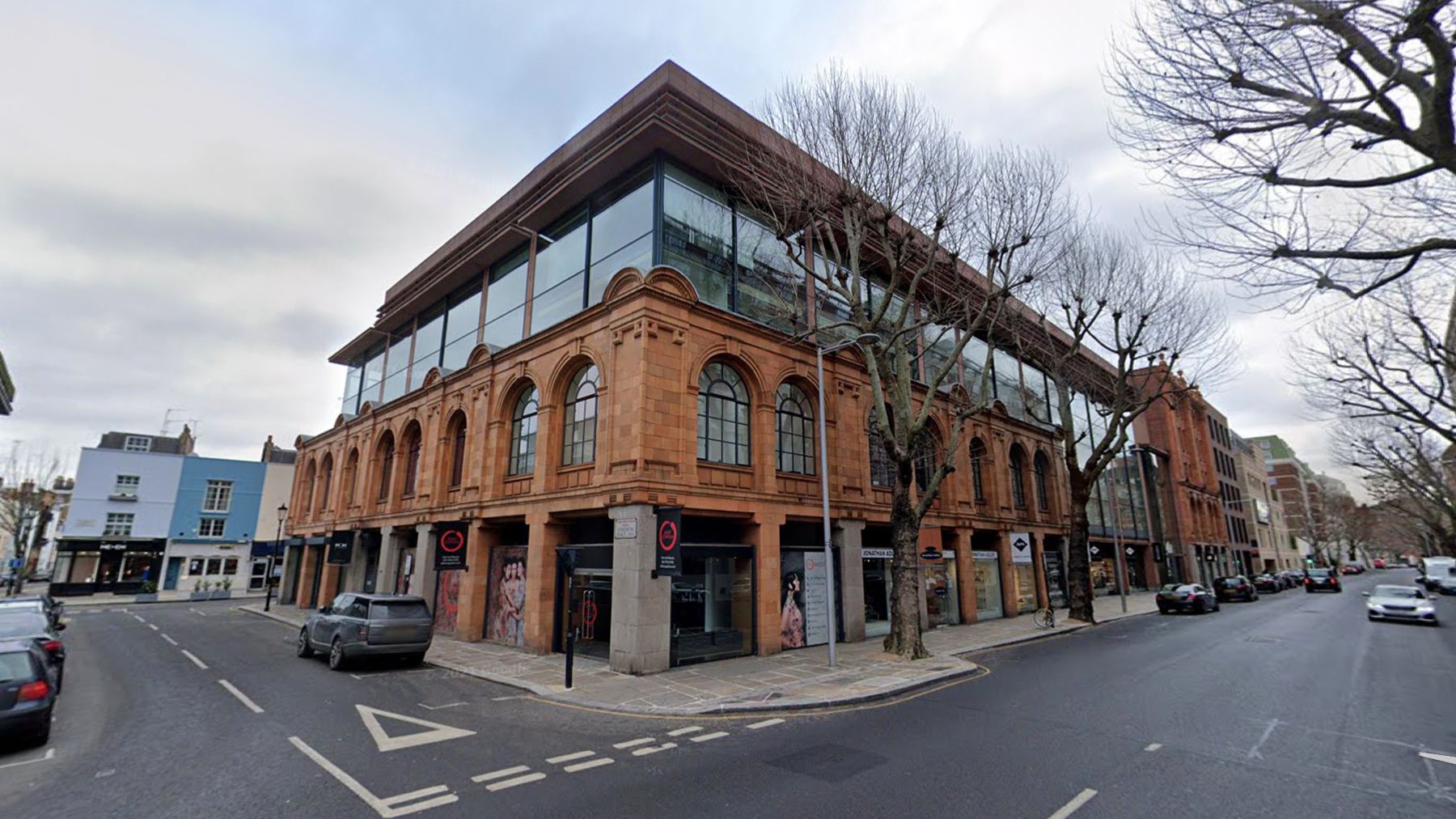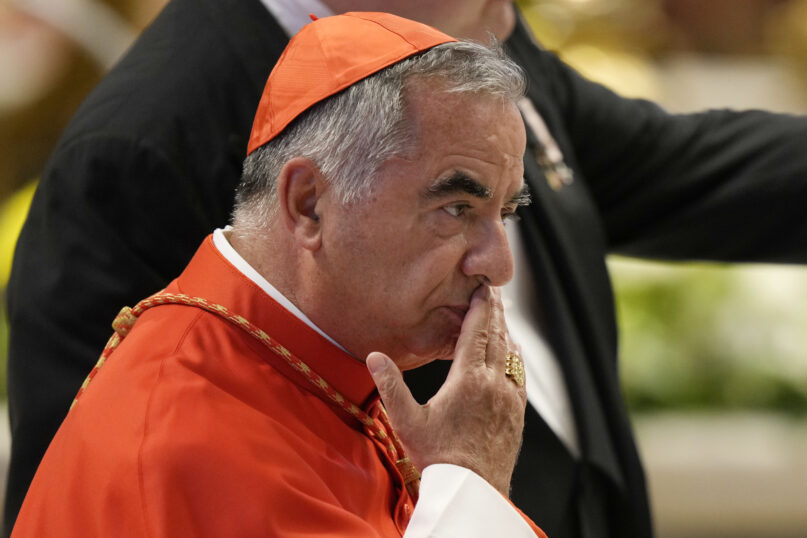VATICAN CITY (RNS) — When Cardinal Angelo Becciu, once a top-ranking Catholic prelate, was sentenced for embezzlement of church funds on Saturday (Dec. 16) — the first cardinal in history to be tried and sent to prison — it was a clear victory for Pope Francis’ mission to clamp down on corruption in the Vatican.
But the trial, heard by a Vatican tribunal over three years, was so unprecedented that its central figure seemed in awe of the historic moment — “I was shocked,” Becciu told the Italian media in apparent disbelief Tuesday, “a cardinal is condemned” — and it left many questions about what was next for the cardinal and eight other defendants found guilty of colluding to defraud the Vatican of millions of euros.
Vatican judges ordered all of those convicted to pay about $200 million in fines, and their assets, totaling $180 million, will be confiscated. Seven were also given prison sentences totaling 37 years. But it’s not certain how those sentences will be carried out if they hold up on appeal.
For the time being, none of the accused will be arrested and the money will stay put.
The trial, which involved 10 defendants in all, centered on the church’s 2014 purchase of a building in London’s Chelsea neighborhood, a former Harrods department store warehouse that was slated to be transformed into luxury apartments.

The London property at the heart of the Vatican financial scandal. (Image via Google Maps)
The Vatican’s Secretariat of State retained an Italian entrepreneur, Raffaele Mincione, to broker the purchase, but in 2019, having discovered a previously undisclosed debt on the property, church officials hired another financier, Gianluigi Torzi, to negotiate an exit from the deal. Torzi structured the transaction so that the church ended up paying millions to gain full ownership of the property.
The Vatican eventually sold the building at a $100 million loss, according to Vatican prosecutors. The sentence of the Vatican tribunal on Saturday sought to at least partially remedy the massive drainage of Catholic funds, already depleted after financial scandals and the consequences of the COVID-19 pandemic.
Most of the defendants, including Torzi and Mincione, were found guilty of crimes related to the real estate deal. Becciu was also convicted of funneling Vatican funds to a company owned by his brother in his native diocese of Ozieri in Sardinia and of paying thousands of euros to Cecilia Marogna, a self-proclaimed intelligence officer, ostensibly to pay the ransom of a kidnapped nun in Mali, but which were instead used to buy luxury goods and vacations.
The seven who were found guilty can now bring their cases to the six judges of the Vatican’s Court of Appeals and may continue to appeal at the Court of Cassation, the highest Vatican court.
Becciu’s defense team has already announced that it will appeal the Vatican tribunal’s decision. Marogna’s lawyers also announced that they will make an appeal.
Vatican judges are also entangled in another thorny case, against the former Vatican financial auditor Libero Milone, who claims he was unjustly ousted by Becciu in 2017 for attempting to investigate his financial dealings.
To complicate matters, foreign courts in Switzerland and the United Kingdom, where much of the assets ordered to be forfeited are held, will have to sign off on the Vatican judges’ sentence. In addition, Mincione is currently suing the Vatican Secretariat of State for reputational damage in British court, where the Vatican hasn’t found much success: In March 2021, British Judge Tony Baumgartner reversed the Vatican’s seizure of Torzi’s assets, describing the Vatican filings as “riddled with inconsistencies.”
If this month’s prison sentences hold up, how they will be carried out is also a complex issue. All the convicted defendants are foreign nationals, with the exception of Becciu, who is the only citizen of the Vatican. The 1929 Vatican treaty with the Italian state, known as the Lateran Accords, provides that Vatican prisoners will be held in Italian prison, with the Vatican covering the cost.
If the Vatican ultimately controls the fate of the seven defendants, the final say will come down to Francis or his successor. As ruling monarchs, pontiffs may offer pardons for those sentenced within the state. A decade ago, Pope Benedict XVI pardoned his butler, guilty of stealing sensitive documents and offering them to journalists in the so-called Vatileaks scandals.
So while a trial aimed at cleaning up the Vatican finances and eradicating the corruption of the Roman Curia seems at first blush to be a win for Francis, the coming legal maneuvers will put on trial the temporal power of the pope and the Vatican’s attempt to to gain recognition in the international community for upholding financial transparency standards.

A screen shows Vatican tribunal president Giuseppe Pignatone reading the verdict of a trial against Cardinal Angelo Becciu and nine other defendants, in the Vatican press room, Dec. 16, 2023. (AP Photo/Andrew Medichini)
There is a sense too that the trial’s fallout will test the Vatican’s judicial system given that the pope can dispose of cases freely and unchecked of his citizens. Defense lawyers in the trial repeatedly questioned the rule of law in the proceedings, especially given the pope’s frequent interventions. Francis issued four decrees granting prosecutors and gendarmes extraordinary powers during the trial to support investigators.
Luis Badilla, author of the popular Catholic blog The Seismograph, alleged that the trial aimed less at justice than at “serving the narrative of Pope Francis in his fight against corruption.”
In an attempt at damage control, Vatican communication director Andrea Tornielli published an editorial on Saturday stressing that the trial “has shown that the Holy See and Vatican City State have the necessary ‘antibodies’ to identify presumed abuses or misconduct.” He said justice was “administered without shortcuts, following the code of practice with respect for the rights of each person and the presumption of innocence.”





